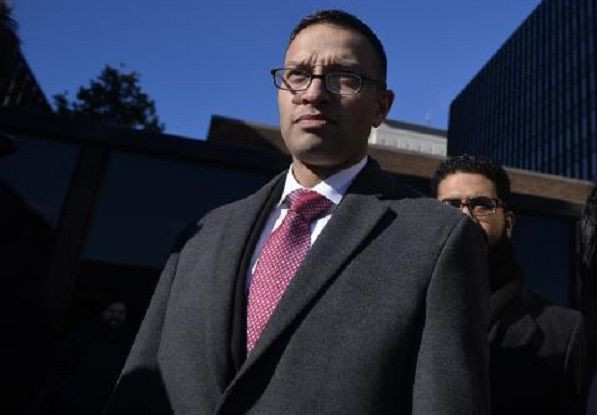Meet The Muslim Americans Voting For Donald Trump, Including An Activist Suing The NYPD Over Surveillance

You would be hard-pressed to find someone more passionate about protecting the civil rights of American Muslims than 39-year-old Farhaj Hassan. A U.S. Army reservist who was deployed to Iraq, Hassan, who lives in Helmetta, New Jersey, is the lead plaintiff in a landmark lawsuit against the city of New York for its police department’s blanket surveillance program of Muslims in the aftermath of the 9/11 attacks. The impetus for the lawsuit, says Hassan, a devout Shiite Muslim, stems from his patriotism and his belief that people should not be treated like suspects simply because of their faith.
It’s altogether bizarre, then, that Hassan — who calls himself a dyed-in-the-wool Democrat — says he is supporting Republican candidate Donald Trump’s bid for the presidency. Yes, the very same Donald Trump who spews fiery rhetoric against Muslims almost daily and has called for banning all Muslims from entering the country.
“I will vote for Trump,” an emphatic Hassan told International Business Times. “Who better than an absolute outsider who isn’t beholden to special interests so far?”
If you just heard the sound of a needle scratching a giant vinyl record, you’re forgiven. For many voters who have come to see Trump as anathema to pluralism and diversity, it’s probably hard to imagine any American Muslim, let alone one like Hassan, pulling the lever for the mogul on Election Day. And yet Hassan is not as unusual as you might think.
A poll of 2,000 registered Muslim voters released in February by the Council on American-Islamic Relations indicated that 7 percent of Muslim voters planned to vote for Trump in the presidential primaries. Their reasons for supporting Trump are varied and complicated, but often reflect a long-standing frustration with American foreign policy and the Democratic politicians who they say have failed them. That sense of feeling let down is coupled with a suspicion that Trump’s rhetoric against Muslims is just a blustery effort to win key votes — one they expect he’ll soften when he’s in office.
Hassan says he has no illusions about Trump, whom he has described as a “raging buffoon” on the campaign trail. Yet he thinks that Trump will serve this country better than both the other Republican candidates and Hillary Clinton, whom Hassan said he considers the inevitable Democratic nominee.
“I have a bigger problem with Hillary Clinton’s classically Zionist-run foreign policy than I do with Mr. Trump’s campaign rhetoric. And I firmly believe that’s all it is — rhetoric,” said Hassan, who added that Clinton’s close ties to AIPAC, a lobbying group that advocates pro-Israel policies, and his belief that she is lying to the American public over her ongoing email scandal make her a disastrous pick for the presidency.
The Usual Suspects Have Failed Muslims
American Muslims, Hassan adds, should reconsider their reflexive support for Democratic candidates. While 72 percent of American Muslims voted for George W. Bush in 2000, Muslims have overwhelmingly supported Democrats in every election since. Hassan questions what that has achieved.
“It was President Obama who tripled surveillance on Muslim communities. And how many times has he increased drone strikes in Afghanistan and Pakistan, killing innocent children?” asked Hassan, pointing to data that indicates drone strikes increased tenfold under the Obama administration, and 90 percent of those killed were not the intended targets.
Saba Ahmed, founder of the Republican Muslim Coalition, a lobbying group focused on representing Muslim interests within the Republican party, agrees with Hassan. The 31-year-old patent attorney frequently turns up on Fox News; in her most famous appearance, she donned a star-spangled hijab, or headscarf, on Megyn Kelly’s show and blasted Trump spokeswoman Kristina Pearson for painting all Muslims with the same brush. Yet in another unlikely twist, she is actively campaigning for Trump. She says that Democratic politicians haven’t served Muslims, and that Republicans actually offer Muslims an opportunity to influence foreign policy.
“Muslims all went for Obama, and he’s the one who has increased drone strikes in places like Pakistan and Afghanistan,” said Ahmed. “Terrorism has increased exponentially as a result. We’re killing so many innocent civilians, and their families take up arms. Obama’s foreign policy has been a disaster. There’s such weak leadership [from Democrats]. We’d get the same with Hillary or Bernie Sanders.”
Cyrus McGoldrick, a 28-year-old American Muslim pursuing a master’s degree in civilization studies in Turkey, said those who criticize Obama’s foreign policy have a point. On a lark last fall, McGoldrick created a satirical “Muslims for Trump” Facebook page, simply to make the point that U.S. foreign policy has taken a disastrous turn and that Trump’s popularity is actually an indictment of America as it stands today. He says that the vibrant anti-war movement that existed during the Bush administration was lulled into complacency by the election of Obama. While he doesn’t actually support Trump’s candidacy, he says a Trump victory could spur an organized movement that could enact real change.
“Donald Trump is really just an extreme version of what every Republican and Democratic candidate really is. If accelerating the disaster will help us move more quickly to the solution, then I’m for that. Maybe that is the lesser of the evils,” said McGoldrick.
Ahmed’s assessment is not as dire; she says that it’s up to American Muslims to make their voices heard with Republicans.
“I think we can influence Republican foreign and defense policies. Republicans are upset about Iraq and Afghanistan. They know they created the ISIS mess,” said Ahmed. “Trump has been the most staunch critic of the Bush administration policies in the Middle East out of all the Republican presidential candidates. He’s not like Bush or the traditional GOP. He’s open to other views, and we just need to do our part in lobbying him.”
Ahmed also credits Trump’s business background as an important factor in lending her support. “I think he can turn the economy around. Washington needs an outsider to shake things up and fix the budget crisis,” she said.
Pro-business policies resonate with other American Muslims supporting Trump, as well. Elhamy Ibrahim, a 62-year-old Egyptian-born businessman from Miami, showed up a Trump rally in Myrtle Beach, South Carolina, recently. “I’m a Muslim and I love you,” he shouted at Trump.
“He’ll bring America back — I want to see America that I used to know, not the one that Obama and George W. Bush destroyed,” Ibrahim told Reuters.
Malek Karim, a 22-year-old business student from Ventnor, New Jersey, appreciates Trump’s firm stance on China. “He would be tougher on China and on things like currency manipulation,” said Karim, whose Bangladeshi immigrant parents are backing Hillary Clinton.
Both Karim and Ibrahim said they are troubled by religious extremism among Muslims and that they believe Muslim immigrants should be vetted thoroughly before entering the United States. And that, they say, is what Trump is proposing.
Hassan adds that issues that are important to all Americans, like national security and immigration reform, are important to American Muslims as well. “If you look at what he’s saying, it’s really not that far off from what most Muslims want — they want Muslim immigrants to be screened and carefully vetted. Unfortunately, he’s using indelicate language because that’s what sells,” said Hassan.
“I think Trump is more moderate and not as far right as some people think,” said Karim. “My first choice was Chris Christie, a moderate. And he has endorsed Trump.”
Hate Speech Or Pandering?
Despite their various reasons for backing Trump, none of these Muslim supporters have turned a blind eye to what critics say is Trump’s harmful anti-Muslim rhetoric. But many like Hassan say that Trump is simply playing on some Americans’ fear of Muslims and minorities as a campaign strategy to maintain his position as the frontrunner.
“Trump’s temporary hate speech, xenophobia and anti-Muslim sentiment is sheer genius. He’s doing it to get the ‘bubba’ vote because that’s what he needs right now. He’ll come closer to the center as soon as the Midwest states start voting, because he has to,” said Hassan.
“Donald Trump is a large-egoed New York businessman. We in New Jersey have grown up with him on our TV screens. He’s not a bad man; this act of being the blue-collar billionaire is fantastic marketing. I doubt he's a misogynistic anti-Muslim hate monger,” he added.
The idea that Trump doesn’t buy his own rhetoric isn’t a new one — and plenty of American Muslims have conceded the point. But it doesn’t matter, critics say. The damage inflicted by his toxic posturing has been done whether he gets elected or not: Trump has unleashed a torrent of anti-Muslim sentiment that is fueling the backlash and discrimination Muslims in this country are now facing.
Hassan recognizes this, as well. But both he and Ahmed agree that Muslims are the minority in the hot seat right now — following a long tradition of groups like Irish, Italians and other immigrant groups that have been persecuted in the United States but have eventually overcome the negative perceptions.

“I agree that Trump’s candidacy and rhetoric has brought out anti-Muslim sentiment that we haven’t seen before. It’s very sad that this has happened, but I do trust in America and my fellow Americans. I think we shall overcome this,” said Hassan.
Ahmad echoes the sentiment: “It’s the political environment in this country right now. Sadly people are targeting Muslims and Islam. They’ve targeted black people, Japanese, Mexicans in the past. Now it’s our turn, and it’s time for us to defend ourselves.”
Ahmed adds that anti-Muslim sentiment is precisely why more American Muslims need to get involved with the Republican party. She says that while she supports Trump, she has held him to account for his negative and what she calls uninformed rhetoric.
“I don’t think he’s serious about what he says. He has worked with Muslims his whole life — he has business interests and properties all over the Middle East,” said Ahmed. “Every time he makes some absurd comment [about Muslims] we reach out to him. I think he could be a great president if he fixes his anti-Islamic rhetoric. And that’s possible. He has toned down his rhetoric against the Latino community and he won the support of Hispanic voters in Nevada.”
Ahmed says that she has invited Trump to visit a mosque during the campaign, and that Trump’s campaign has been receptive to her views.
“His campaign manager has indicated that Mr. Trump might be willing to meet us at a mosque in New York — Trump knows many Muslims there,” said Ahmed. “It’s an opportunity for us to write the narrative. He sounds uneducated about Islam and Muslims, and unless we change the narrative it will continue to be defined by anti-Islamic players in Washington, D.C.”
Trump’s campaign did not respond to IBT’s request for comment.
Both Ahmed and Hassan are also confident that some of Trump’s more outlandish proposals, like instituting a ban on Muslims, are so unconstitutional that they would never become a reality.
“Trump is not going to get all crazy anyway because there’s the separation of powers. You still have a gridlocked Congress, you still have military heads who will not allow him to go full Dr. Strangelove. The presidency isn’t as big as it once was,” said Hassan.
Still, Hassan says he is not about to go door-to-door handing out leaflets for Trump anytime soon.
“It pains me to admit that I’m going to pull the lever for this guy,” he said. “But what the hell else do we have? I don’t think it will be as bad as people think. … What’s the worst that can happen?”
© Copyright IBTimes 2024. All rights reserved.





















